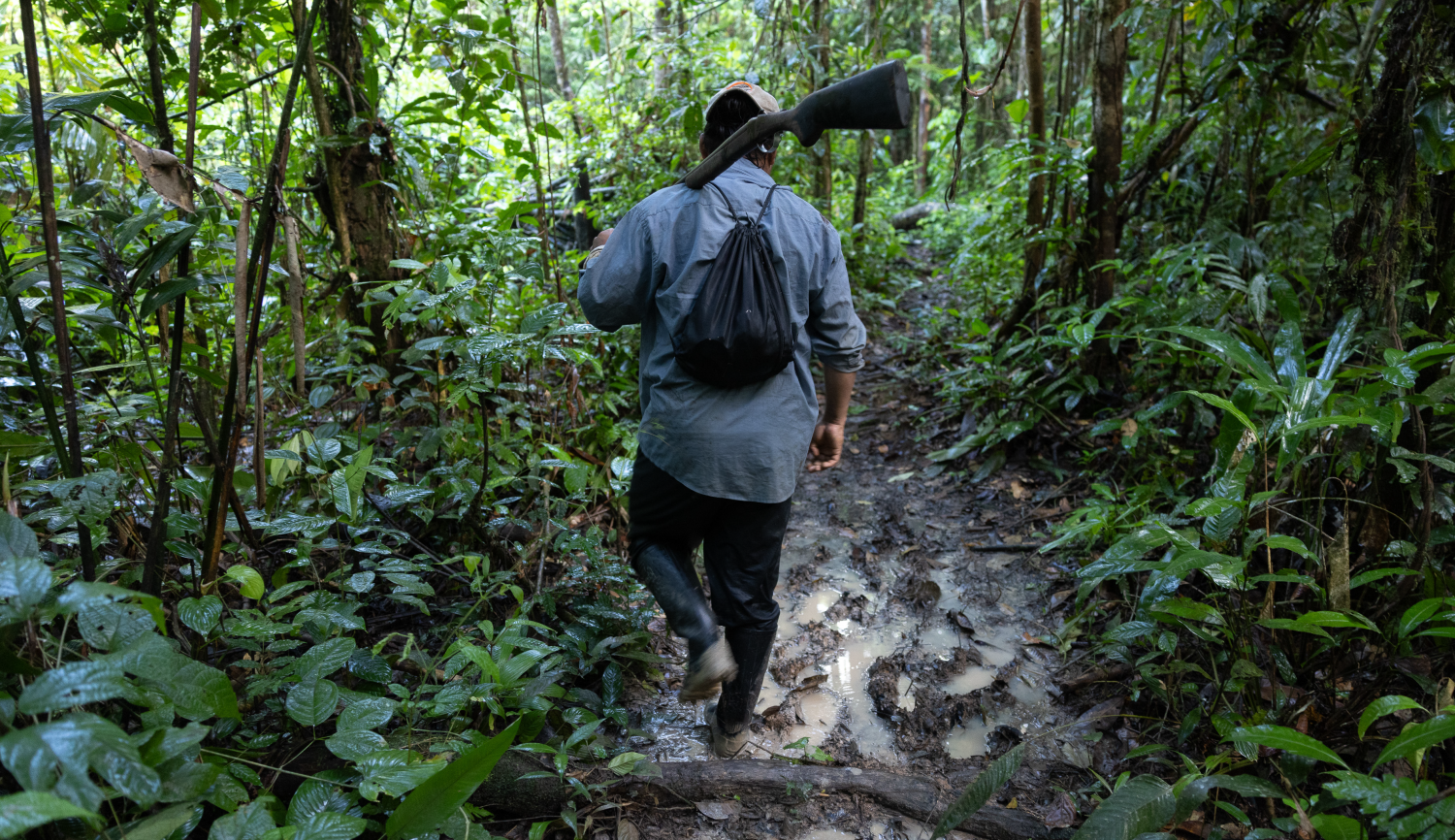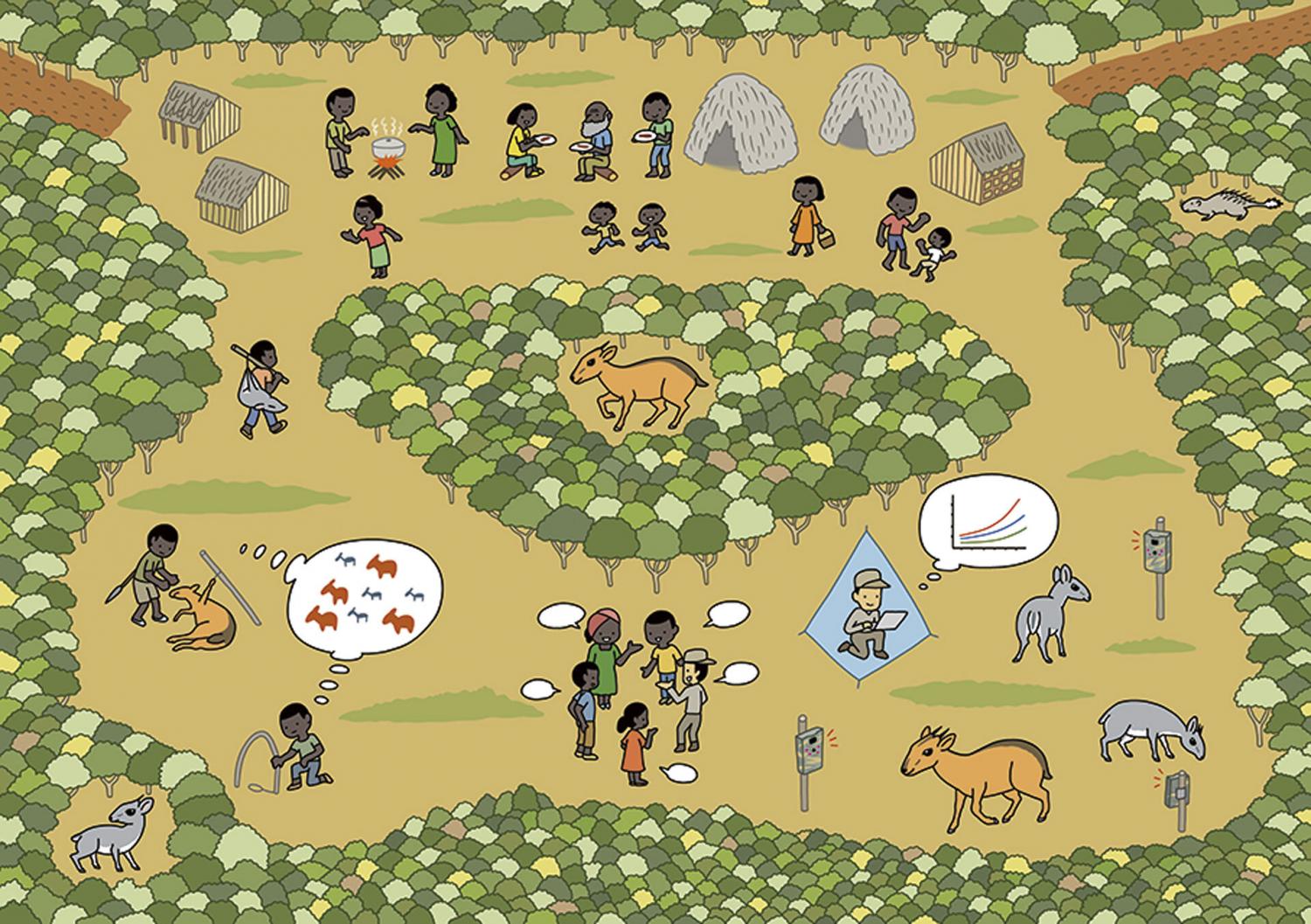
Research Program
Global Environmental Culture Program
Fashloks Project
- Related links
Fair and Sustainable Hunting Management through Dialogues between Local Knowledge and Science
Abstract
In tropical rainforests around the world, there are growing concerns about the decline of wildlife due to excessive hunting, leading to the implementation of strict conservation policies. However, these policies are also threatening the survival of local hunting cultures. To resolve this wild meat crisis, cooperation between local knowledge and science is essential, based on equal dialogue between local communities and conservation organisations. Through coproduction research, we aim to establish locally led, sustainable hunting management systems.
Why do this research?
Tropical rainforest wildlife, such as duikers, wild boars, monkeys, and crocodiles, support rich biodiversity through processes like the food chain and seed dispersal. At the same time, these animals provide valuable protein and income to the people living in the forests and have contributed to developing unique social norms and worldviews, acting as a source of cultural diversity. And there is a livelihood connecting wildlife and people—hunting.
Through the 20th century, however, hunting pressure in tropical rainforest regions rapidly increased, and significant declines in wildlife populations were reported. This issue gained international attention as the wild meat crisis, leading to top-down conservation measures, such as protected areas and strict hunting restrictions. As a result, even subsistence hunting by local communities has been restricted, causing conflicts between conservation officials and local people.
The wild meat crisis represents a typical example of a global environmental problem driven by the friction between global values (wildlife conservation) and local values (the survival of hunting culture). At the root of this issue lies a fundamental misunderstanding between scientific ecology and local knowledge. While there are many commonalities in practical applications, there are significant differences in their basic approaches and priorities. Consequently, methods and decisions based solely on one knowledge system are often not seen as fair or sustainable by the other. The true solution to the wild meat crisis requires a deeper mutual understanding between scientific and local knowledge, alongside the development of a locally based wildlife management system that actively incorporates subsistence hunting.
Project aims
The Fashloks project aims to develop fair and sustainable wildlife monitoring methods and hunting management systems across five sites in the three major tropical rainforests. To achieve this, the project adopts a coproduction research approach, where researchers and local communities collaborate as equals in designing, implementing, and evaluating studies.
We will jointly test scientific methods proposed by ecologists and methods based on local knowledge from skilled hunters to create wildlife monitoring methods. At two main sites in Cameroon and Colombia, we will also establish platforms where all stakeholders can equally participate in decision-making. Furthermore, we will describe and compare the research processes at the five sites to assess the effectiveness of the coproduction approach in addressing global environmental issues.
Results
What we know so far
During the Pre-Research phase in 2024, we focused on laying the groundwork for research activities at each site. This involved conducting preliminary surveys on wildlife and local livelihoods, explaining the project to local communities and obtaining their approval, signing MoUs between local research institutions and RIHN, and expanding our team with researchers from Japan and the host countries. The groundwork for coproduction research between researchers and local communities is now in place for the Full-Research phase.
Noteworthy items
Preliminary research has revealed site-specific differences in the relationships between scientific conservation and local culture, even within tropical rainforest regions. The Cameroon and Gabon sites prioritise scientific conservation over local cultural practices; the Colombia and the Democratic Republic of the Congo sites place greater emphasis on local cultural practices; and the Borneo site faces mutual distrust that weakens the connection between conservation efforts and local culture. By documenting and comparing research activities across these sites, we can assess the effectiveness and challenges of the coproduction approach under different conditions.
News
-
{{ data.disp_date }}
{{ data.content }}
Member
Project Leader
HONGO Shun
Associate Professor, RIHN / Junior Associate Professor, Kyoto University
Sub Leader
TOKUYAMA Nahoko (Chuo University)
Researchers at RIHN
HASHIZUME Akane (Researcher)
HANZAWA Maho (Researcher)
SEKINO Ayako (Researcher)
HIROSHIMA Yukiko (Research Associate)
Main Members
YASUOKA Hirokazu (Kyoto University)
VAN Vliet, Nathalie (Center for International Forestry Research, CIFOR)
NAKABAYASHI Miyabi (Hiroshima University)
MATSUURA Naoki (Sugiyama Jogakuen University)
NAKASHIMA Yoshihiro (Nihon University)
Evaluation by an external evaluation committee
Research schedule
| 2023 | 2024 | 2025 | 2026 | 2027 | 2028 | 2029 |
|---|---|---|---|---|---|---|
| FS | FS/PR | FR1 | FR2 | FR3 | FR4 | FR5 |



